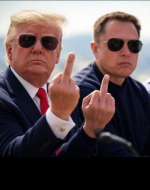President Trump on Thursday signed an executive order purporting to outlaw collective bargaining across two thirds of the federal government, citing a little-used provision of federal labor law relating to national security issues.
A fact sheet announcing the policy document says that Trump cited a rarely used provision of the 1978 Civil Service Reform Act allowing the president to exclude agencies and agency subcomponents from collective bargaining rules if the rules “cannot be applied to that agency or subdivision in a manner consistent with national security requirements.”
Trump first considered using this authority in early 2020, granting then-Defense Secretary Mark Esper the ability to exclude the Pentagon from federal labor law. Following bipartisan pushback in Congress, Esper elected not to use the authority.
According to the White House, Trump’s edict “ends collective bargaining” with unions at the Defense, State, Veterans Affairs, Justice and Energy departments, as well as portions of the Homeland Security, Treasury, Health and Human Services, Interior and Agriculture departments.
The International Trade Administration, Environmental Protection Agency, U.S. Agency for International Development, the Nuclear Regulatory Commission, National Science Foundation, International Trade Commission, the Federal Communications Commission and General Services Administration also are no longer subject to federal labor law, nor are chief information officers’ offices across government.
All told, the agencies covered by Trump’s order amounts to 67% of the federal workforce, and 75% of federal workers who are currently represented by unions.








